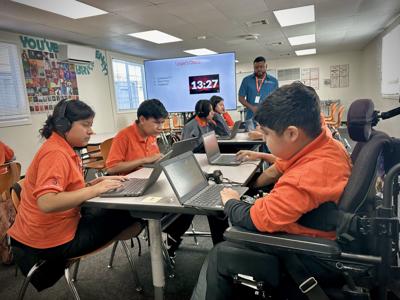
Students in class at Encore Arts and Media College Prep High School. Photo by Brenda Verano
In response to ongoing disputes surrounding the teaching of ethnic studies in California, Assemblymembers Rick Chavez Zbur and Dawn Addis and State Senator Josh Becker have introduced Assembly Bill 1468 (AB 1468). The bill seeks to standardize the state’s ethnic studies curriculum across high schools, at a time when California's ethnic studies framework has become a lightning rod for controversy.
The issue came to the forefront following a lawsuit filed by a group called Concerned Jewish Parents and Teachers of Los Angeles. The plaintiffs alleged that the Liberated Ethnic Studies Model Curriculum Consortium, United Teachers of Los Angeles (UTLA) and its president Cecily Myart-Cruz, and two members of the LAUSD-UTLA Ethnic Studies Committee had encouraged the adoption of teaching materials that included Palestinian history, which they argued were biased and antisemitic. On November 30, 2024, U.S. District Judge Fernando Olguin dismissed the case, citing insufficient evidence and unclear arguments.
One of the defendants in the lawsuit, Guadalupe Cardona, an ethnic studies educator with over 25 years of experience, has remained vocal about her concerns for the future of ethnic studies education. She asserted that the introduction of AB 1468 was also a direct response to the defeat of Assembly Bill 2918 (AB 2918), which was introduced in 2024 to strengthen the development and implementation of ethnic studies courses in K-12 schools. The bill did not pass and was held in committee on August 15, 2024, for further deliberation to gather more input from educators, community members and stakeholders.
Critics of AB 2918 feared it could suppress certain perspectives within ethnic studies curricula, particularly discussions of Palestinian history, potentially making public education hostile to individuals already targeted by anti-Palestinian racism. Many educators, including Cardona, played a key role in organizing against the bill, arguing it could restrict the very essence of ethnic studies. Cardona and other activists, supported by organizations such as the California Teachers Association (CTA) and California Faculty Association (CFA), helped convince lawmakers to reject the bill.
Cardona’s concerns are not limited to AB 2918. She now voices similar objections to AB 1468. She argues that ethnic studies cannot be standardized because each discipline, whether Chicano Studies, Black Studies or Indigenous Studies, is distinct in its frameworks and epistemologies. Attempting to impose a one-size-fits-all approach, she believes, would undermine the flexibility and richness of the field. Furthermore, she views AB 1468 as a potential attempt to censor specific topics, particularly Palestinian history—an issue that was central to the dismissed lawsuit.
On Tuesday, February 25, 2025, the Israeli-American Civic Action Network, alongside several other organizations, hosted a webinar titled "California Forum on Ethnic Studies in Public Schools," which sparked a lively discussion among a diverse panel of educators, students and parents. The event featured sharp opinions over the state’s approach to ethnic studies, particularly in the wake of the proposed AB 1468 bill.
Attendees at the webinar voiced strong opposition to the current ethnic studies curriculum, arguing that the course was unnecessary and overly fixated on narratives of oppression. Several speakers expressed a desire for a curriculum that emphasizes the resilience and achievements of marginalized communities, rather than predominantly framing their histories through the lens of oppression. One student participant argued that ethnic studies should not be mandatory, claiming it indoctrinates students and fosters division. Others raised concerns over what they viewed as an imbalanced portrayal of the oppressed vs. oppressor dynamic when discussing colonization.
Supporters of AB 1468 contend that the bill seeks to address many of the concerns raised during the discussion. If enacted, the legislation would mandate the state board to develop standardized content guidelines for ethnic studies courses in California high schools.
The timing of AB 1468's introduction also coincides with a February 20 announcement that the Santa Ana Unified School District (SAUSD) reached a settlement agreement regarding its ethnic studies courses. The American Jewish Committee and the Louis D. Brandeis Center for Human Rights Under Law filed in September 2023, claiming the courses contained anti-Semitic content and presented false narratives about Israel. As part of the settlement, SAUSD agreed to halt the offering of certain ethnic studies courses until they are redesigned with public input, in compliance with California's open meeting laws.
However, the situation in Santa Ana underscores the broader challenge facing ethnic studies. The district's decision to settle—bowing to pressure from outside groups—sets a concerning precedent for future challenges to ethnic studies and academic freedom. Ethnic studies advocates, including Cardona, emphasize the critical role of attorneys and the support of the broader community in standing firm against such pressures, particularly when it comes to teaching about Palestine, a topic increasingly targeted by political forces.
Cardona draws a parallel between the attack on ethnic studies and the broader dismantling of Diversity, Equity and Inclusion (DEI) initiatives. Both movements face mounting opposition from right-wing political factions. She warns that these attacks are not just about academic freedom; they are part of a broader effort to marginalize Palestinian rights and frame progressive stances as politically inconvenient.
The ethnic studies debate in California has revealed a divide within the state’s legislative ethnic caucuses. While only some members of the Latino caucuses have supported AB 1468, Cardona has called for greater accountability from Latino political leadership. “I think for too long we missed out on the opportunity to push our Latino caucus on this issue” she states, “and to push for other ethnic caucuses to stand in solidarity with the marginalized people of their communities.”
For Cardona and many other educators, the primary goal of ethnic studies is to give marginalized students a chance to see themselves represented in the curriculum—a rare opportunity for many students. Ethnic studies is about affirming identities, understanding history and providing students with the tools to navigate and challenge a world shaped by racial and ethnic inequalities.











(0) comments
Welcome to the discussion.
Log In
Keep it Clean. Please avoid obscene, vulgar, lewd, racist or sexually-oriented language.
PLEASE TURN OFF YOUR CAPS LOCK.
Don't Threaten. Threats of harming another person will not be tolerated.
Be Truthful. Don't knowingly lie about anyone or anything.
Be Nice. No racism, sexism or any sort of -ism that is degrading to another person.
Be Proactive. Use the 'Report' link on each comment to let us know of abusive posts.
Share with Us. We'd love to hear eyewitness accounts, the history behind an article.